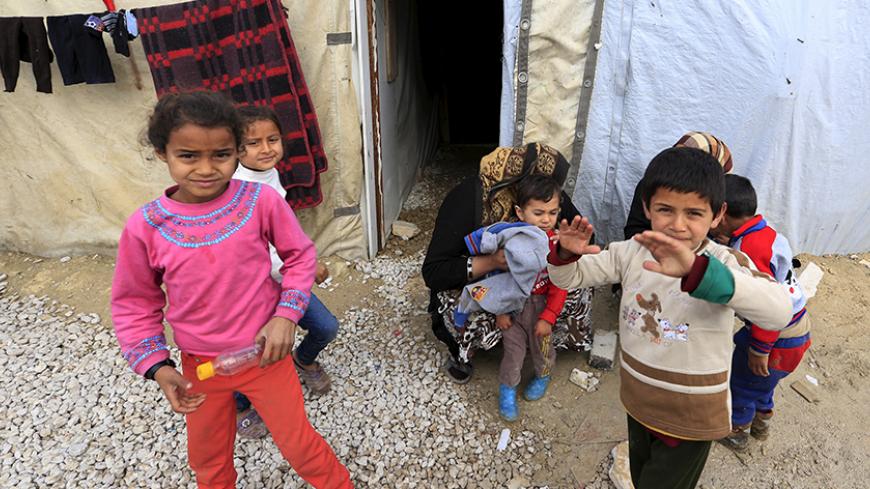BAALBEK, Lebanon — This week, as the international community marked the annual World Refugee Day, the Syrian crisis has entered its sixth year. Nearly 5 million Syrians are taking refuge all across the Middle East while others, including many Syrian children, continue to risk their lives for a chance to reach Europe’s doorsteps.
In 2014, only three years into the conflict, UNICEF reported that “Syria is now one of the most dangerous places on earth to be a child.” Nearly half of the war-torn country is displaced. According to the United Nations, children make up almost half of the refugee and the internally displaced populations. Life expectancy has fallen by 20 years.
Today, the mass migration of Syrian refugees poses an even more urgent need for humanitarian aid and physiological and mental health relief — particularly among the crisis’ most innocent victims, Syria’s children. They may have survived six years of war, but many now carry enduring mental scars from the conflict.
“My friend was stabbed by another boy. I don’t want to be like them,” Ahmad, who lives among other vulnerable Palestinian and Syrian refugees in Lebanon, told Al-Monitor.
Ahmad, 14, looked down as he walked the streets of Sabra and Shatila, trying to avoid eye contact with other residents in the densely populated Palestinian settlement in Beirut. He did not look afraid, but the half-blind teenage boy’s cautious strides were a testament to lingering unease.
The United Nations High Commissioner for Refugees (UNHCR) reports, “The most prevalent and most significant clinical problems among Syrians are emotional disorders, such as: depression, prolonged grief disorder, post-traumatic stress disorder and various forms of anxiety disorders.”
“It’s very hard to live here. I don’t have that many friends, maybe one or two,” Ahmad said, as he alluded to the prevalence of bullying among the Syrian, Palestinian and Lebanese children who are all trying to coexist and integrate in a country of only 4.4 million that is hosting more refugees per capita than any other in the world.
A UNHCR-commissioned review of mental health and psychological support staff working with Syrians affected by armed conflict stated, “The girls mentioned that they experienced enormous physical and social isolation, as well as widespread discrimination and harassment." The report went on, "Syrian adolescent boys also faced discrimination and were commonly subject to bullying and other forms of physical violence."
Dr. Inka Weissbecker is a global mental health and psychosocial adviser for the International Medical Corps (IMC). She told Al-Monitor, “Mental health issues impair all function of life and the longer it goes untreated, the more you see its impacts amplified.”
She added, “Being subjected to such difficult and hostile environments increases the risk for mental health problems as well as violence.” According to Weissbecker, research shows that recovery environments can be more predictive of mental health problems than past traumatic events and stressors, meaning that for many Syrian youths who have witnessed and experienced horrors of war, their current environment is just as or even more important for their mental health.
Ahmad’s mother, Dalal, pointed to her daughter Rula, 10, and said, “She still shivers and fears bombs. They’ve seen so much that I can’t even explain.”
Dalal said that all four of her children were at risk of being kidnapped in her hometown of Daraa — the epicenter of the conflict that became the Syrian civil war. “Soldiers would come and take the children in the morning before they get on the school bus — some rebels, some thugs. They were at risk of either dying by bombs or being kidnapped. We had to leave,” she said.
Weissbecker told Al-Monitor that after witnessing the violence and tragedies that these refugees endured, it is only natural for many of them to suffer “from some sort of emotional and psychological condition.”
Local Lebanese social workers and nongovernmental organization staff members say that Ahmad and his family are among the lucky refugee families who can afford to live in urban areas. Unlike Ahmad, Khalil and his family live in an unofficial tent in a refugee camp in Baalbek, Lebanon, a 20-minute drive from Syria’s western border.
Khalil, 13, and his five siblings are from Homs, Syria’s third-largest city that is now reduced to rubble. “There are so many basic necessities that these people need that medical and psychological needs really come as secondary,” Yasser Zgheib told Al-Monitor. “If children don’t put their talent, their energy, their emotion into positive activities, it can soon be put into negative engagements like gangs and violence,” said Zgheib, who works with a local nonprofit youth organization in Baalbek that aims to integrate Syrian refugee teens with their Lebanese counterparts through sports and community activities.
Khalil wore a nervous smile that he could not contain. His father said he suffers from frequent anxiety attacks that started three years ago after they fled Homs.
“I’ve never seen children as damaged, and yet I’ve never seen any population of damaged children and adults with this level of resilience.” said Dr. Annie Sparrow, a pediatrician and a public health specialist. She told Al-Monitor, “The younger we treat these conditions the better results we see.”
With the vivid urgency of medical and psychological needs among Syrian refugees, challenges go far beyond funding and lack of resources.
Zeinab Hijazi is a mental health and psychosocial support consultant for various international relief organizations including the IMC. She explained that in countries such as Lebanon, Jordan and Turkey refugees face a range of challenges that make it difficult for them to recognize and address physiological and mental health needs.
Hijazi said that most psychiatrists and psychologists work in the private sector and these privatized services are centralized within the capital, Beirut, and “thus the most vulnerable population — including Syrian refugees, most of whom are in the north and Bekaa governerates — cannot access or simply cannot afford these services.”
She added, “Stigmas and taboos are still issues, particularly due to the privatized and nonintegrated nature of mental health services available.”
Both Weissbecker and Sparrow as well as many local nongovernmental organizations inside Lebanon emphasize the tremendous need to train health practitioners in these areas. They also say that international relief organizations are not giving enough attention and funding to the mental health crisis faced by Syrian refugees, both those in the Middle East and those who have made it to Europe.
“We need to realize what we are doing is not working. The traditional agencies who used to provide humanitarian solutions do not have the creativity to address this,” Sparrow said. “Syrians themselves need to do simple things and we need to provide the tools and training to allow them to help themselves.”






